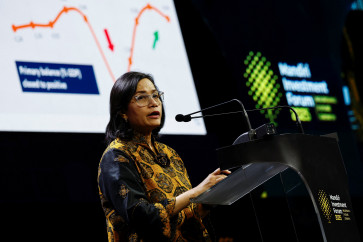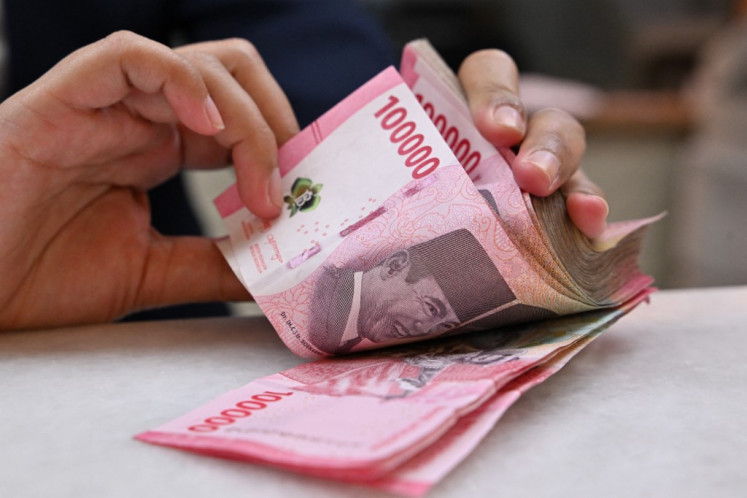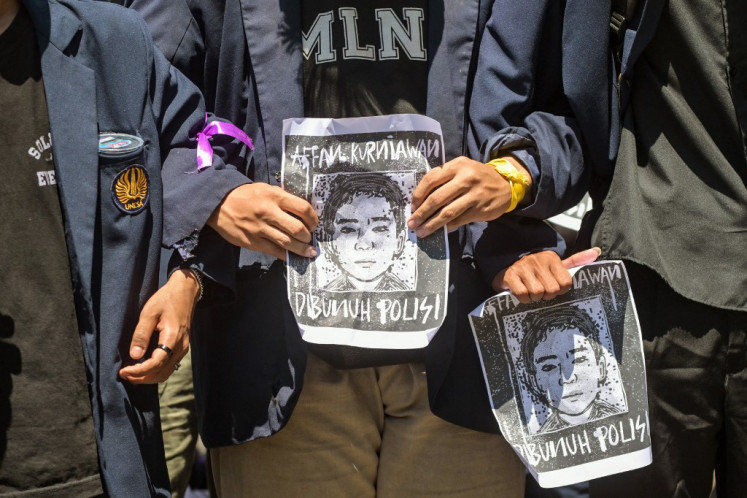Popular Reads
Top Results
Can't find what you're looking for?
View all search resultsPopular Reads
Top Results
Can't find what you're looking for?
View all search resultsOne century on, Jakarta’s Batak church remains oasis of culture, spirituality
Almost a century after the Batak Protestant Church (HKBP) was established in Jakarta, the church that started humbly as a place for migrants from North Sumatra to gather in what was then Batavia, continues to remain an oasis of culture and spirituality for ethnic Batak Christians
Change text size
Gift Premium Articles
to Anyone
A
lmost a century after the Batak Protestant Church (HKBP) was established in Jakarta, the church that started humbly as a place for migrants from North Sumatra to gather in what was then Batavia, continues to remain an oasis of culture and spirituality for ethnic Batak Christians.
According to the book Riwayat HKBP Jakarta (the history of HKBP Jakarta), Batak people began migrating to the Dutch East Indies capital of Batavia in search of work or to study after the Batak War in 1907, which saw their North Sumatra homeland incorporated into the Dutch East Indies.
However, the initial influx of Batak people was still slow, with only around 30 Batak Christians living in the city by 1917. In the absence of Batak churches, they attended other churches.
Feeling the desire to pray and hold services according to their denomination and with other Batak people, the congregants gathered at the Hollandsch-Inlandsche School, a Dutch school for native Indonesians in what is now known as Kwitang in Senen, Central Jakarta.
The first service was held on Jl. Kernolong 37, now known as Jl. Kramat IV, on Nov. 20, 1919, marking the establishment of the HKBP church, the first Batak church in Jakarta and Java.
Indonesian Communion of Churches (PGI) secretary-general Gomar Gultom, who is a HKBP congregant himself, said the establishment of the first Batak church in Jakarta also showed the communal strength of Batak people and how well they interacted with other Jakartans.
When the Batak people wanted to hold their first service, Gereformeerde Kerk, which is now the Indonesian Christian Church (GKI) Kwitang, stepped in to help, with minister L. Tiemersma holding the initial services. The Kwitang church even helped provide a salary for the first HKBP minister, Mula Nainggolan, in 1922.
Gomar said that history had shown that the HKBP church was initially supported by other churches. “Today’s generation might not know that the establishment of the Batak church was not only supported by Batak people,” Gomar told The Jakarta Post on Wednesday.
He said that HKBP congregants should reflect on the church’s history to be inspired to help people from outside their church today.
Gomar said what made the HKBP church stand out from other churches was that ethnic Batak Christians used their mother tongue and were able to mingle with those of the same cultural background.
“Batak people can listen to sermons in Indonesian, but the messages will penetrate better if they listen to sermons in their mother tongue,” Gomar said.
However, this also made the HKBP church exclusive, he added.
“I advise Batak people to be more open to other people, no matter their ethnicity or culture. When building a church it must be well integrated. Don’t build a big and luxurious church when the locals still suffer from poverty,” Gomar said.
There are now 83 HKBP churches in Jakarta, and about 159,000 congregants, according to Midian Sirait, the HKBP Jakarta district head.
Midian said the 100 year anniversary of the Batak church in Jakarta should serve as a time to reflect on the grace of God and the deeds of people who helped start the church.
HKBP Kernolong’s congregants have included one of Indonesia’s first leaders, former prime minister Amir Sjarifoeddin, as well as noted writer Merari Siregar and former social affairs minister A.M. Tambunan.
“My message is that we should grow and respect others because we are all neighbors,” Midian said.
For its congregants, the church remains an oasis for their culture.
Ivanto Petrus Simamora, 25, who is currently pursuing a master’s degree at the University of Indonesia, said he regularly attended services at the HKBP Menteng church in Central Jakarta.
Hailing from Pematangsiantar, North Sumatra, he said he planned to work in Jakarta for a few years before returning to his hometown.
“My family still holds on to the Batak culture. I’ve attended other churches just to find out about their services, but I prefer the HKBP church,” Ivanto said.
He said he hoped the HKBP church could continue to preserve the Batak language and culture.
“I hope the HKBP church can continue to grow and spread good tidings to all its congregants,” Ivanto said.
Meanwhile, for first generation Batak migrant, Marisi Dameria, 54, the HKBP church was a place that allowed her to feel in touch with her culture.
“For me personally, it’s the camaraderie, as we are all of the same ethnicity, and it is also possible to meet my relatives at church,” Marisi said.
She said she and her husband first arrived in Jakarta in 1976, but had frequently moved from city to city. She gave birth to three of their children in Jakarta and gave birth to their youngest in Bandung, West Java.
No matter where they are, her family seeks to attend services at a Batak church, Marisi said.










